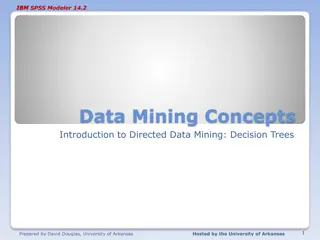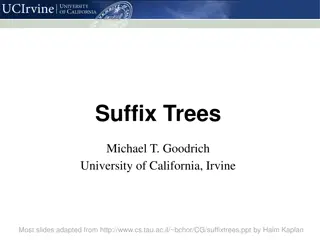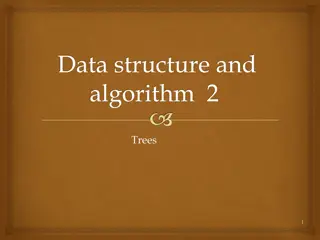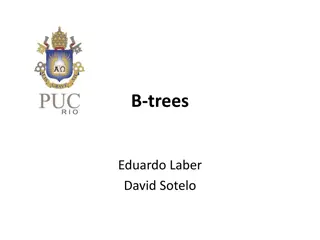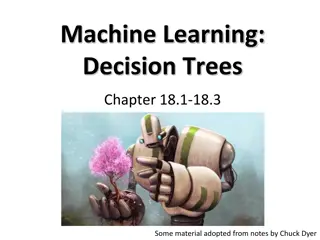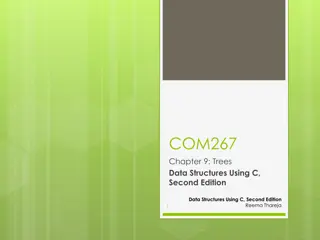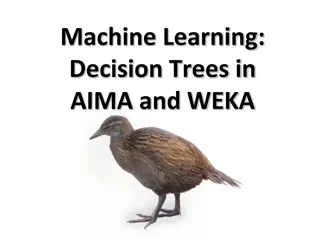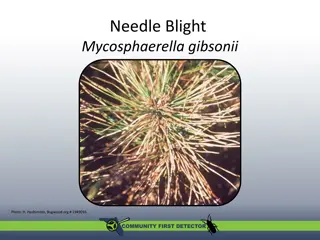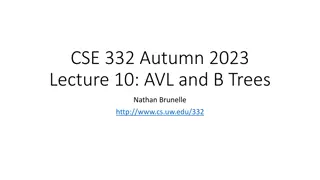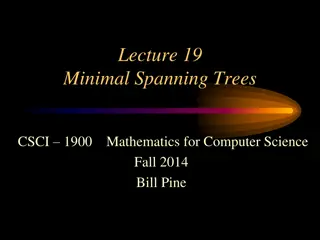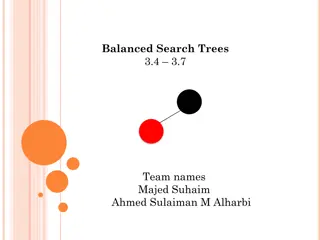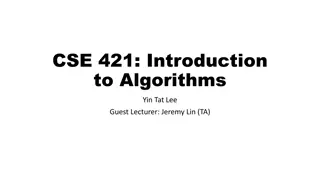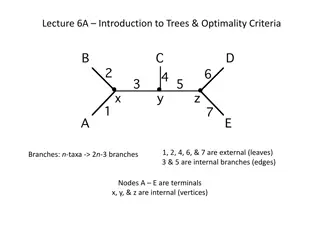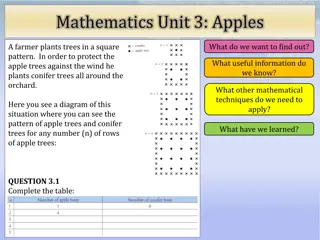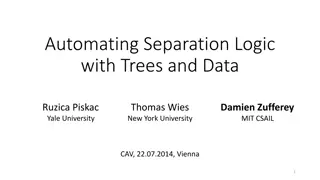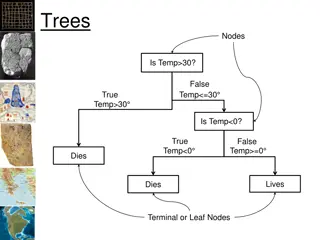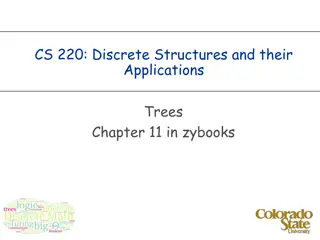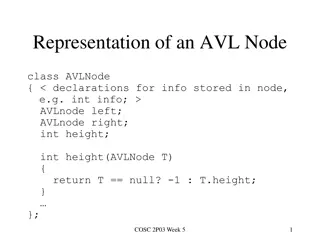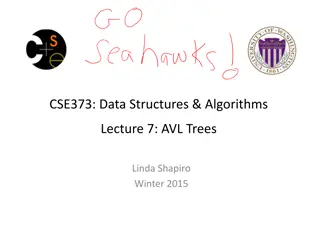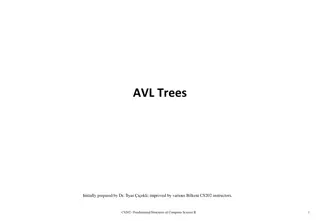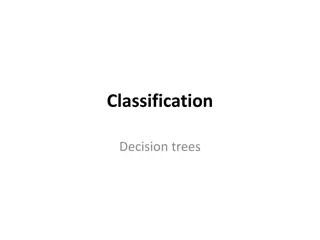Mycorrhizal Association and Its Importance in Water Mining
Mycorrhizal association plays a crucial role in facilitating nutrient and water absorption for plants through a symbiotic relationship with fungi. This relationship enhances the plant's ability to acquire minerals from the soil while providing essential compounds to the fungi. The mycorrhizal associ
3 views • 6 slides
Understanding the General Characteristics of Gymnosperms
Gymnosperms, originating in the Paleozoic era, were dominant in the Jurassic and Cretaceous periods. With naked seeds and xerophytic traits, these plants exhibit unique features such as heterospory, symbiotic root associations, and different leaf types. Examples include Cycus, Pinus, and Gnetum. The
5 views • 41 slides
Monumental Trees of Italy - A Natural Legacy of Grandeur and Cultural Significance
Italy boasts a rich heritage of monumental trees, defying the challenges of nature and human exploitation to grow into majestic and culturally significant specimens. These grand trees symbolize the enduring bond between nature and humanity, embodying naturalistic, aesthetic, and historical values. T
7 views • 23 slides
Understanding Language Syntax Through Syntax Trees
Explore how both programming languages and spoken languages can be parsed into syntax trees, revealing the syntactic structure of sentences. Learn about terminals and non-terminals in syntax trees and how they represent different components of language. Dive into syntax tree abstraction for a deeper
3 views • 32 slides
Introduction to Decision Trees in IBM SPSS Modeler 14.2
Learn about decision trees in IBM SPSS Modeler 14.2, a powerful data mining concept for classification and prediction. Decision trees help in dividing records based on simple decision rules, making them a popular tool for data exploration and model building. Explore examples and understand the impor
1 views • 28 slides
Understanding Suffix Trees: A Comprehensive Overview
Explore the concept of suffix trees through detailed explanations, diagrams, and examples. Learn about tries, compressed tries, suffix tree construction algorithms, and more. Discover how suffix trees are used to efficiently store and search for substrings in a string.
1 views • 21 slides
Understanding Trees in Data Structures and Algorithms
In this chapter, you will learn about trees as a data structure, including definitions, types, and key concepts such as nodes, edges, levels, and heights. Trees play a crucial role in organizing data efficiently, and understanding them is essential for mastering algorithms and data structures.
2 views • 9 slides
Understanding B-Trees: Efficient Data Storage and Retrieval
B-Trees are balanced search trees designed for secondary storage devices, commonly used by databases. They can have many children, allowing for efficient data organization. The branching factor of B-Trees keeps their height low, making them ideal for minimizing disk I/O operations. This article expl
1 views • 76 slides
Understanding Timber Production: Types, Classification, and Sustainability
Timber production involves the classification of timbers into hardwoods and softwoods based on the type of trees they come from. Hardwoods are from deciduous trees, while softwoods are from coniferous trees. Sustainable forestry practices, including managed logging activities, ensure the responsible
1 views • 11 slides
Performance of Nearest Neighbor Queries in R-trees
Spatial data management research focuses on designing robust spatial data structures, inventing new models, constructing query languages, and optimizing query processing. This study explores the estimation of query performance and selectivity, specifically in R-trees, for efficient access planning.
1 views • 32 slides
Understanding AVL Trees: A Self-balancing Binary Search Tree
AVL trees, named after their inventors Adelson-Velski & Landis, are self-balancing binary search trees where the height difference between left and right subtrees is limited. This ensures a balanced factor of -1, 0, or 1, leading to efficient operations such as insertion and deletion. Rotation techn
2 views • 21 slides
Understanding Decision Trees in Machine Learning
Decision trees are a popular supervised learning method used for classification and regression tasks. They involve learning a model from training data to predict a value based on other attributes. Decision trees provide a simple and interpretable model that can be visualized and applied effectively.
1 views • 38 slides
Exploring Trees Data Structures Using C - Second Edition
Learn about trees data structures in the context of programming using the C language. This comprehensive guide covers topics such as types of trees, tree creation, traversal, basic terminologies, and different tree structures like binary trees and binary search trees. Dive into the world of trees da
1 views • 54 slides
Understanding Trees: Identification, Characteristics, and Types
Explore the world of trees through tree identification, forest ecosystems, dendrology, and the distinguishing features of trees and shrubs. Learn about conifers vs. deciduous trees, the defining attributes of conifers, examples of conifer species, and the characteristics of conifer leaves and needle
0 views • 32 slides
Understanding Decision Trees in Machine Learning with AIMA and WEKA
Decision trees are an essential concept in machine learning, enabling efficient data classification. The provided content discusses decision trees in the context of the AIMA and WEKA libraries, showcasing how to build and train decision tree models using Python. Through a dataset from the UCI Machin
3 views • 19 slides
Understanding Decision Trees: A Visual Guide
Explore the concept of Decision Trees through a rule-based approach. Learn how to predict outcomes based on a set of rules and visualize the rule sets as trees. Discover different types of Decision Trees and understand which features to use for breaking datasets effectively.
0 views • 28 slides
Needle Blight Mycosphaerella Gibsonii: Symptoms, Host Plants, and Management
Needle blight caused by the fungal pathogen Mycosphaerella gibsonii is a serious disease affecting various species of Pinus trees. The disease, first recorded in Japan in 1913, primarily impacts seedlings and saplings, leading to significant infection rates and death rates under epidemic conditions.
0 views • 21 slides
Understanding Priority Queues and B-Trees in Data Structures
Explore the concepts of priority queues and B-Trees, including rigorous problem-solving in homework assignments. Discover the key elements of B-Trees, their implementation, and benefits. Gain insights into memory architecture considerations and the importance of properly aligning nodes. Learn about
0 views • 82 slides
Understanding AVL and B-Trees in CSE 332 Autumn 2023
AVL trees are self-balancing binary search trees that ensure the heights of left and right subtrees differ by at most one, maintaining balance during insertions and deletions through rotations. This lecture delves into AVL trees, their implementation, balancing techniques, and examples, along with i
0 views • 35 slides
Understanding Red-Black Trees for Balanced Search Structures
Red-black trees are balanced binary search trees ensuring a maximum height of O(log n). They maintain balance properties by coloring nodes red or black, with operations such as search, insertion, deletion efficiently managed in O(log n) time. Red-black trees exhibit guaranteed height bounds for impr
0 views • 26 slides
Understanding Height-Balanced Binary Trees and AVL Trees
The efficiency of tree operations like searching, insertion, and deletion is closely tied to the tree's height. Maintaining a balanced height in trees, such as AVL trees, ensures O(log2n) complexity for efficient operations. Learn about height-balanced binary trees, how to check if a tree is balance
0 views • 27 slides
Understanding Red-Black Trees and BST Properties
Red-black trees are balanced BSTs with specific properties like color rules and black node count. They ensure O(logn) height for balanced trees. Learn about the characteristics, insertion methods, and rotations in red-black trees compared to BSTs.
0 views • 44 slides
Understanding Minimal Spanning Trees in Graph Theory
Dive into the concept of minimal spanning trees in graph theory with a focus on algorithms like Prim's and Kruskal's. Explore the definition of trees, spanning trees, and weighted graphs. Learn about the importance of finding the minimal spanning tree in a graph and how it contributes to optimizatio
0 views • 16 slides
Understanding Balanced Search Trees and Red-Black Trees
Balanced Search Trees ensure efficient data retrieval by maintaining balancedness properties within the tree structure. Red-Black Trees are a type of binary search tree with specific coloring rules that help in balancing and efficient searching. Learn about the structure, properties, and worst-case
0 views • 75 slides
Understanding Spanning Trees and Minimum Spanning Trees
Explore the concept of spanning trees and minimum spanning trees in graph theory through an in-depth lecture outline covering topics like Cut Property, Cycle Property, Kruskal's Algorithm, and more. Delve into the significance of Minimum Spanning Trees (MSTs) as the lowest-cost spanning tree of a gr
0 views • 41 slides
Understanding Trees and Optimality Criteria
In this lecture, you will delve into the world of trees and optimality criteria. Explore concepts like external and internal branches, terminal nodes, and vertices. Discover the Newick format for tree representation, the rooting of trees, and free rotations around nodes. Dive into the growth of tree
0 views • 15 slides
Solving the Apple Tree and Conifer Tree Pattern Puzzle
In this mathematics unit, we explore a scenario where a farmer plants trees in a square pattern, with conifer trees surrounding the apple trees for protection against the wind. The task involves completing a table to understand the pattern for different numbers of rows of apple trees. Through this e
0 views • 15 slides
Implementation of Red-Black Trees in 2-3 Trees
Implementation of Red-Black Trees within the structure of 2-3 Trees involves representing 3-nodes using red links, maintaining specific restrictions on representation, ensuring perfect black balance, and establishing a correspondence between red-black BSTs and 2-3 trees. Observations include the col
1 views • 8 slides
Automating Separation Logic with Trees and Data
This content discusses the automation of separation logic using trees and data, focusing on extracting the maximum element in a Binary Search Tree (BST). It covers the motivation behind the procedure for extracting the max element, memory safety considerations, functional correctness, and preserving
0 views • 38 slides
All About Sumac Trees: Features, Uses, and Care Tips
Sumac trees, known for their shrubs and small trees with clusters of reddish drupes, are commonly found in North America and Africa. These trees, comprising approximately 250 species, are used for landscaping but some species can cause skin irritation. With minimal care requirements, sumac trees can
0 views • 11 slides
Understanding Classification and Regression Trees
Classification and Regression Trees are powerful tools used in data analysis to predict outcomes based on input variables. They are versatile, easy to interpret, and can handle both categorical and continuous predictors. Different types of trees, such as Regression Trees, Boosted Trees, and Random F
0 views • 16 slides
Understanding Unrooted Trees in Phylogenetics
Explore the concept of unrooted trees in phylogenetics, including Newick strings, induced quartet trees, and representations. Learn about the importance of drawing rooted and unrooted trees, as well as understanding the relationship between unrooted trees and binary rooted evolutionary trees.
0 views • 63 slides
Understanding Trees in Discrete Structures
Discrete Structures and Their Applications Trees Chapter discusses the properties and theorems related to trees in graph theory. Trees are defined as connected, undirected graphs with no cycles. The content covers the characteristics of leaves, internal vertices, and the relationship between the num
2 views • 28 slides
Data Structure Concepts: AVL Trees and B-Trees
The content covers important concepts related to AVL trees and B-trees, including the representation of an AVL node, insertion operations, rotations for balancing, and definitions of B-trees. AVL trees are self-balancing binary search trees used to maintain balance during insertions and deletions, w
0 views • 14 slides
Enumerating All Spanning Trees of a Directed Graph
This research paper discusses an algorithm for enumerating all spanning trees of a directed graph, providing insights into the computation process and properties of the spanning trees. The algorithm outlined by Kapoor and Ramesh, along with references to related work, forms the basis of the discussi
1 views • 33 slides
Understanding AVL Trees in Data Structures
AVL trees are self-balancing binary search trees that help maintain efficiency in operations by ensuring the tree remains balanced. By enforcing a balance condition, AVL trees aim to keep the depth of the tree logarithmic, leading to O(log n) complexity for operations such as find, insert, and delet
0 views • 39 slides
Understanding AVL Trees: Balanced Search Trees for Efficient Operations
AVL Trees are balanced search trees that ensure efficient insertion, deletion, and retrieval operations with a worst-case time complexity of O(log N). Named after their inventors Adelson-Velskii and Landis, AVL Trees maintain balance by limiting the height difference between left and right subtrees
0 views • 28 slides
Understanding Decision Trees in Classification
Decision trees are a popular machine learning algorithm for classification tasks. They consist of nodes representing conditions, branches indicating decisions, and leaves representing outcomes. By choosing the best attribute and splitting data recursively, decision trees can efficiently classify dat
0 views • 47 slides
Your Interiors with Beautiful Artificial Trees – Perfect for Every Space
Artificial trees are the ultimate solution for those looking to add a touch of greenery to their spaces without the hassle of maintenance. From small artificial bonsai trees to big artificial trees for living rooms, these faux plants bring life and e
3 views • 9 slides
Understanding Decision Trees in Machine Learning
Explore the world of Decision Trees in Machine Learning, from building and balancing trees to regression techniques. Learn about best practices, challenges, and common questions surrounding Decision Trees in this insightful overview.
0 views • 24 slides




